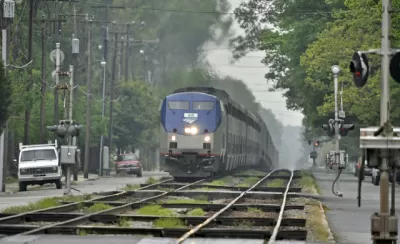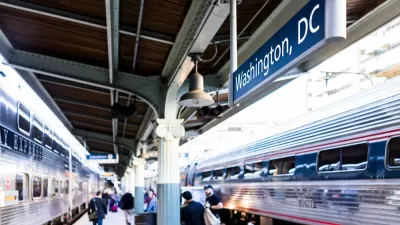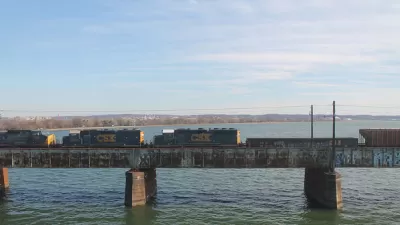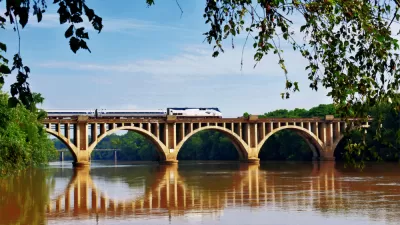The pieces of the still-speculative Southeast High Speed Rail Corridor—connecting Atlanta to Washington, D.C.—are starting to take shape. The latest leg to come into focus would connect Richmond to D.C.

"Faster, more frequent trains between DC and Richmond could be on the way," reports Stephen Repetski. The improved train service would come as a result of new tracks as well as changes to existing tracks for the DC2RVA Rail Improvement Project under consideration by the state of Virginia.
"The overall goal is to add nine daily round-trip trains from North Carolina or Norfolk/Newport News that would travel up through DC to Amtrak’s Northeast Corridor including Baltimore, Philly, and New York," according to Repetski. The project would require $5.2 billion to make the improvements necessary to achieve those goals.
Repetski notes that the DC2RVA Rail Improvement Project is "part of a larger network slowly being studied from DC down to Atlanta," known as the Southeast High Speed Rail Corridor. The D.C. to Richmond portion of the high-speed rail corridor is in the second phase of the project.
The article includes a lot more detail about the DC2RVA project, including some notes about the shortcomings of the project as currently envisioned. For instance, according to Repetski,"Virginia is looking to make trains operate at up to a maximum of 90 miles per hour in the corridor, which is still lower than what Amtrak's regular Northeast Regional trains can operate at between DC and New York."
FULL STORY: New DC to Richmond tracks would mean faster, more frequent Amtrak and VRE

Alabama: Trump Terminates Settlements for Black Communities Harmed By Raw Sewage
Trump deemed the landmark civil rights agreement “illegal DEI and environmental justice policy.”

Planetizen Federal Action Tracker
A weekly monitor of how Trump’s orders and actions are impacting planners and planning in America.

The 120 Year Old Tiny Home Villages That Sheltered San Francisco’s Earthquake Refugees
More than a century ago, San Francisco mobilized to house thousands of residents displaced by the 1906 earthquake. Could their strategy offer a model for the present?

Opinion: California’s SB 79 Would Improve Housing Affordability and Transit Access
A proposed bill would legalize transit-oriented development statewide.

Record Temperatures Prompt Push for Environmental Justice Bills
Nevada legislators are proposing laws that would mandate heat mitigation measures to protect residents from the impacts of extreme heat.

Downtown Pittsburgh Set to Gain 1,300 New Housing Units
Pittsburgh’s office buildings, many of which date back to the early 20th century, are prime candidates for conversion to housing.
Urban Design for Planners 1: Software Tools
This six-course series explores essential urban design concepts using open source software and equips planners with the tools they need to participate fully in the urban design process.
Planning for Universal Design
Learn the tools for implementing Universal Design in planning regulations.
Clanton & Associates, Inc.
Jessamine County Fiscal Court
Institute for Housing and Urban Development Studies (IHS)
City of Grandview
Harvard GSD Executive Education
Toledo-Lucas County Plan Commissions
Salt Lake City
NYU Wagner Graduate School of Public Service





























